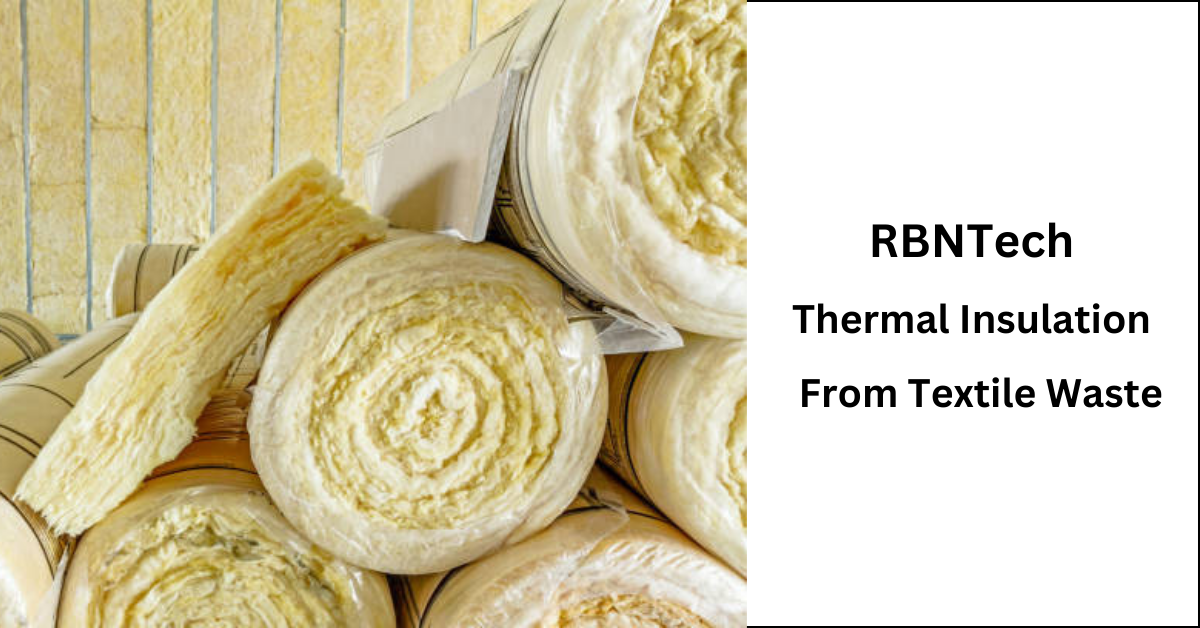A group of like-minded environmental enthusiasts came together to create RBNTech. What started out as a sustainable manufacturing facility for women’s sportswear, Reborn, saw the birth of an innovative solution to handle the textile waste generated from this facility to achieve a zero-waste process that was not only beneficial for the environment but also a solution that addresses the issue of thermal insulation in the Lebanese market.
RBNTech creates thermal insulation material from textile waste that can be installed in walls during the construction phase or at a later stage. By doing so, RBNTech contributes to a 15% decrease in the carbon footprint and energy expenses for homeowners.
We spoke with Zeina Farah, co-founder of RBNTech, one of the three winners of the second edition of the DAWERR Ideathon 2022, an Activity funded by the United States Agency for International Development (USAID), to discuss the importance of their startup in tackling textile waste, the challenges they faced, and their future plans.
Q: What prompted the idea of RBNTech?
A: Few years ago, we founded Reborn, a sustainable manufacturing facility for women’s sportswear, with the support of Berytech. We had successfully minimized the textile shreds generated from our apparel production; however, we still had to deal with the inevitable waste generated from this production that normally ends up in landfills to achieve a zero-waste process. Through extensive research and experimentation, our team leveraged their expertise in engineering and textiles to create a novel process for converting textile waste into insulation material for building construction.
We started observing the thermal insulation materials used in the construction of buildings which sparked numerous inquiries such as: How much carbon are we really offsetting by installing polystyrene? Would it be worth the hazardous waste and the polluting process involved in producing it? Isn’t there another, or a better way to insulate our houses? And that’s how RBNTech came to life. Unlike conventional insulation methods, it is eco-friendly, and safer for human health, yet still delivers the same level of thermal insulation efficiency. Moreover, it proved to be more efficient both in terms of insulation and installation.
Q: What differentiates RBNTech from traditional thermal insulation materials?
A: This solution was created with a passion for preserving the environment. It delivers a triple positive impact by preventing textile waste from being disposed of in landfills, lowering the carbon footprint generated from heating and cooling, and conserving natural resources by using recycled materials instead of virgin materials in insulation production.
Q: What is the significance of adopting RBNTech in Lebanon?
A: Our solution is primarily created with the interests of all homeowners in mind, it allows them to reduce their cooling and heating needs as well as their carbon footprint and energy expenses. This is especially important not only for the environment but also for Lebanon because it addresses some of the significant challenges we are facing in the country.
By recycling textile waste, we are helping to solve a portion of the solid waste problem by diverting textile waste away from landfills and freeing up space for other types of non-recyclable waste. We are also uplifting the Lebanese industrial sector since the thermal insulation materials made from textile waste will be produced in Lebanese factories.
Q: What are some of the challenges that you faced during the implementation phase of your project and how did you overcome them?
A: Developing the prototype was our first challenge as it required access to large machinery not available in Lebanon. An additional challenge we are facing at the moment is building our own machinery.
The only way we were able to overcome these challenges was through continuous learning and embracing failure to learn and move closer to success.
Q: What are the future plans for RBNTech?
A: We plan on constantly innovating and finding new ways to advance in green technologies that reduce carbon footprint and divert waste.
Q: How did your involvement in the DAWERR Ideathon impact your startup?
A: Green entrepreneurs should take advantage of the opportunity to participate in the DAWERR Ideathon, a program that brings together key players and experts from USAID and Berytech. We applied with the expectation of getting support from the program in all aspects of our startup: mainly validating the solution and developing the Minimum Viable Product (MVP) and that’s exactly what we received. Thanks to their support, we were able to develop the first two versions of our prototype, validate our product-market fit, and build the financial model around it. Now, we can confidently say that we have a working MVP and are in the process of building our first production line.
Q: What do you think is the importance of similar programs for startups in Lebanon?
A: Having ideas is good but without execution, they are just ideas. Programs that help entrepreneurs transform their ideas into successful businesses are essential. Many entrepreneurs thrive in such programs as they receive the support they need and have the opportunity to learn from industry experts. These programs are helping the entrepreneurial ecosystem, hence, supporting our economy and our environment.
Q: Lastly, What advice would you give to entrepreneurs who are just starting their journey in the solid waste management sector?
A: If you keep an idea that you have been thinking about in your head, it won’t happen. Have a clear vision of your solution, assess the risks, and be willing to take them. I promise you will fail, a lot! But only because success comes afterward. Every successful entrepreneur and businessperson have failed before succeeding.
We had a breakthrough not long ago in building our final product, but it was the result of several failures. Failures have to happen. We now embrace them and learn from them as these are indicators that success is getting closer or that we are getting to success.










